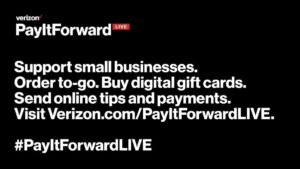
Michelle Miller, Vice President of Verizon Consumer Group, discusses how the company is managing connectivity challenges presented by COVID-19, its new videoconferencing platform BlueJeans, and the outlook for wider 5G deployment across the Dallas Region.
This Q&A is part of an ongoing series of DRC interviews with representatives from our member organizations about how they are facing the COVID-19 pandemic.
Q: How has Verizon adapted, as a business and a corporate citizen, to customers spending more time at home, resulting in increased network usage?
A: Customers are relying on our networks more than ever to connect with family and friends, stay on top of work responsibilities, and learn remotely. We’re making it easier for them to do this through:
-
-
- Free premium content channels;
- Free access to educational apps for students;
- Unlimited domestic calling for wireless consumers on limited-minute plans;
- Free international calling for consumer wireless and home voice customers to select countries;
- Waived activation fees on new wireless lines of service and upgrades;
- Free access to The New York Times for high school students; and
- A new affordable FiOS home internet option for low-income households.
-
We have waived late fees and overage charges for residential customers, and automatically provided an additional 15GB of high-speed data for mobile customers. We have also extended both of these benefits to our small business customers.  Another way we are helping small businesses is through PayItForwardLIVE, a weekly livestream series featuring some of the biggest names in entertainment. Verizon donates to LISC.org to support small businesses every time the hashtag #PayItForwardLive is used.
Another way we are helping small businesses is through PayItForwardLIVE, a weekly livestream series featuring some of the biggest names in entertainment. Verizon donates to LISC.org to support small businesses every time the hashtag #PayItForwardLive is used.
We’re also helping those who serve. We’ve extended our deepest wireless plan discounts to include teachers and nurses, offering four lines for as little as $30/line on Start Unlimited. We have a similar offer that is available to first responders, and active military members and veterans.
To date, Verizon has committed more than $50 million in contributions and donations to nonprofits serving students, health care first responders, and small businesses.
Q: How is Verizon working to ensure network reliability and positive customer experiences despite higher pressure on networks?
A: Verizon’s networks have been engineered to perform during moments of crisis and disaster such as hurricanes, snowstorms, and flooding. During this time of heightened worry and concern, our primary goal is to keep our customers, employees, and society connected to the things that matter most to them: family, friends, and business customers.
Connectivity is what allows our students to learn, our doctors and nurses to treat, our first responders to protect, and our families and communities to stay connected. Our network data shows us that on weekdays, we are currently seeing twice the daily call volume of Mother’s Day. Think about that – 800 million calls a day. People are talking on the phone about 33 percent longer and sending 9 billion texts a day.
When it comes to data, they’re using 218,000 TB of data per day – that’s 106 million hours of streaming video. We’ve begun to see this flatten out over the past two weeks, indicating people are in a new normal. But video gaming, VPN, calling, and data usage are up compared to pre-COVID times.
Q: Many businesses have put planned investments on hold, yet Verizon is acquiring BlueJeans to expand its B2B market. What opportunities do you see in the Dallas Region with this new product and for wider deployment of 5G in North Texas?
A: The transaction will combine BlueJeans’ simple, smart, and trusted meeting platform with Verizon’s unified communications as a service to businesses immediately. Customers will benefit from a BlueJeans enterprise-grade video experience on Verizon’s high-performance global networks. Collaboration and communications have become top of the agenda for businesses of all sizes and in all sectors in recent months, in the Dallas Region and across the globe.
The crisis we’re in has certainly been a validation for use of this strategy and allows us to add to our unified communications and collaboration portfolio immediately. We have said before that we will expand our 5G Ultra Wideband mobility service to 30 more cities in 2020, and we’ll add 5G home service to another 10 cities. Additionally, we are expanding the service in cities that already have Verizon 5G Ultra Wideband service, so the Dallas Region should continue to see Verizon 5G service in more places throughout the year.